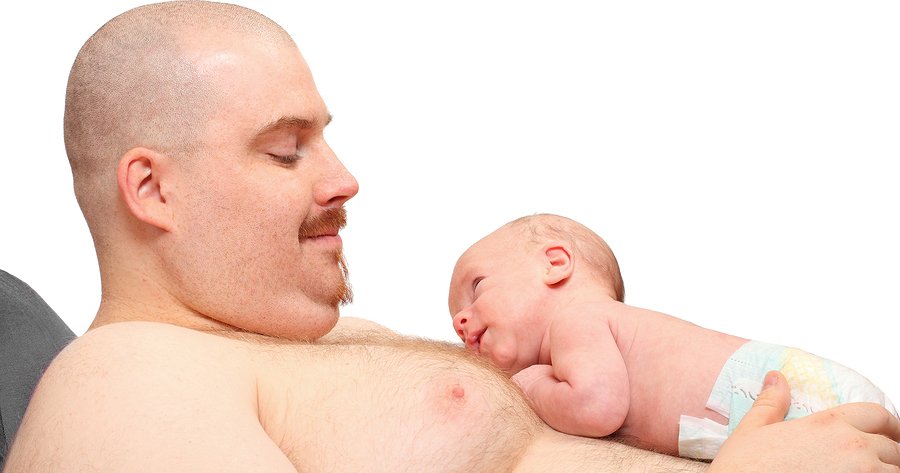It’s a familiar scenario, supported by studies: after a woman gets pregnant, she cleans up her act, giving up drinking and dissolute diet habits for the duration. If she’s particularly enlightened, she might even go holistic when she’s trying to get pregnant to give the baby the best chance of being born healthy. The man, meanwhile, goes partying with friends, swaggering around in anticipation of smoking that cigar. The days of dissolute dads-to-be might be numbered, though, because new research shows that it’s at least as important for men as for women to follow healthy routines and get in shape well before inception to ensure that the fetus will thrive.
It’s been known for some time that children of obese fathers tend to become obese themselves, even if the mother isn’t overweight. To verify that this phenomenon is due to genetics and not due to the possibility that obese men overfeed their kids and generally set a bad example that the kids emulate, researchers at the University of Copenhagen compared the sperm of normal-weight men to the sperm of obese men, and sure enough, they found significant differences.1 Feller, Stephen. “Fathers may pass obesity to children through sperm.” 4 December 2015. UPI. 4 December 2015. http://www.upi.com/Health_News/2015/12/04/Fathers-may-pass-obesity-to-children-through-sperm/1301449234787/ (Actually, this wasn’t the first study to find that obesity shows up in sperm. In fact, a 2013 study out of Duke University found that altered DNA markers in the sperm of obese men put their offspring at heightened risk for developing certain cancers.2 “Obesity in Dads May be Associated with Offspring’s Increased Risk of Disease.” Duke Medicine. 4 December 2015. http://corporate.dukemedicine.org/news_and_publications/news_office/news/obesity-in-dads-may-be-associated-with-offsprings-increased-risk-of-disease ) However, the previous studies merely showed that the altered gene was inherited–not how it became altered.
In the current study, the investigators wanted to know if obesity was written into the sperm, or if the father’s lifestyle choices actually affected the way his sperm developed. 3 Knapton, Sarah. “Unhealthy lifestyle choices of men are written into their sperm, study finds.” 3 December 2015. The Telegraph. 4 December 2015. http://www.telegraph.co.uk/news/science/science-news/12031527/Unhealthy-lifestyles-of-men-are-written-into-their-sperm-study-finds.html The study group included 13 thin and 10 obese subjects. Sure enough, the sperm of the thin men looked different from the sperm of the obese ones, and even more, “obese sperm” acted differently. In fact, the researchers recorded differences between the thin and obese groups in more than 9000 genes, and the main variations had to do with whether certain markers in the genes were switched on or off.4 Zusi, Karen. “Obesity Alters Gene Epigenome.” 3 December 2015. The Scientist. 4 December 2015. http://www.the-scientist.com/?articles.view/articleNo/44696/title/Obesity-Alters-Sperm-Epigenome/ But, the scientists believe, those variations were not necessarily written into the genetic code. Rather, they most probably had to do with eating and exercise choices the men made.
It’s a known fact that lifestyle habits can provoke chemical changes that lead markers in the genes to switch on or shut down, which means that even if two sets of genes are identical structurally, they’ll behave very differently depending on what environmental factors they’re exposed to. Eating a donut every day and gaining 70 pounds may switch certain markers off. Enjoying daily broccoli might switch other markers on. In this case, the changes in the DNA of obese men were focused in gene regions associated with appetite control and brain function.
As Dr. Romain Barres, one of the researchers from the University of Copenhagen explains, we “receive more than a random mix of genes from our ancestors…[but also receive] a biological imprint of their behavior and lifestyle.”
To confirm the findings, the scientists next examined the sperm of men who had undergone gastric bypass surgery. They found that one week after the surgery, 1509 genes already had changed. By a year after the surgery, that number had increased to 3910, perhaps because the subjects altered their eating and exercise patterns after the surgery, and that continued to alter their DNA.
What does all of this data mean? For one thing, it indicates that by losing weight and exercising, men can change their DNA. It also means that fathers ostensibly can pass on genes that put their kids at risk of having out-of-control dietary habits and ending up obese, with all the associated diseases that obesity confers.
Dr. Barres explains, “Obese men have [DNA] information that can be transferred to children that could potentially affect their eating behavior. And this information can be changed if obese men lose weight.”
That’s the key. If obese men lose weight, they might be able to affect the health of future generations. Then again, the scientists studied only the fathers and not their children, and so there’s still no 100 percent proof that the alterations in a father’s DNA caused by obesity actually do manifest in their offspring, or even if, in fact, those epigenetic variations get passed down. Still, the experts think it’s highly likely that they do and are planning further research to verify this.
In any event, as Jon Barron pointed out a number of years ago, it turns out that men are no longer excused from the need to be exemplary health citizens when they’re considering parenthood. If not for their own well-being, they need to think about the way drinking that keg of beer is going to impact their children to be.
References
| ↑1 | Feller, Stephen. “Fathers may pass obesity to children through sperm.” 4 December 2015. UPI. 4 December 2015. http://www.upi.com/Health_News/2015/12/04/Fathers-may-pass-obesity-to-children-through-sperm/1301449234787/ |
|---|---|
| ↑2 | “Obesity in Dads May be Associated with Offspring’s Increased Risk of Disease.” Duke Medicine. 4 December 2015. http://corporate.dukemedicine.org/news_and_publications/news_office/news/obesity-in-dads-may-be-associated-with-offsprings-increased-risk-of-disease |
| ↑3 | Knapton, Sarah. “Unhealthy lifestyle choices of men are written into their sperm, study finds.” 3 December 2015. The Telegraph. 4 December 2015. http://www.telegraph.co.uk/news/science/science-news/12031527/Unhealthy-lifestyles-of-men-are-written-into-their-sperm-study-finds.html |
| ↑4 | Zusi, Karen. “Obesity Alters Gene Epigenome.” 3 December 2015. The Scientist. 4 December 2015. http://www.the-scientist.com/?articles.view/articleNo/44696/title/Obesity-Alters-Sperm-Epigenome/ |











